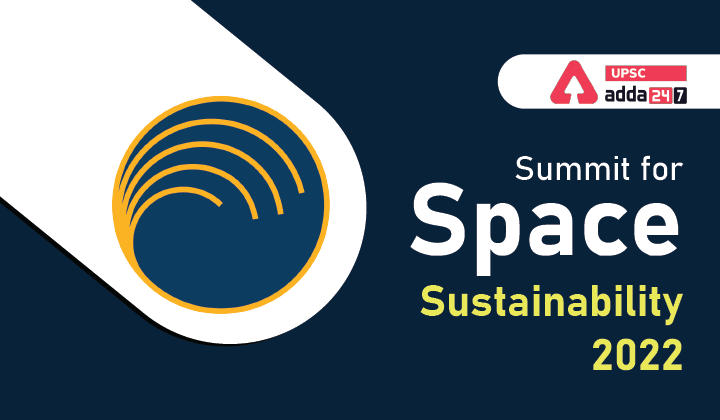Table of Contents
Summit for Space Sustainability 2022- Relevance for UPSC Exam
Summit for Space Sustainability 2022: Summit for Space Sustainability is being held to promote sustainable use of space by managing and reducing space debris and other space wastes.4th Summit for Space Sustainability 2022 is important for UPSC Mains GS Paper 2 (International Relations- Bilateral, regional and global groupings and agreements involving India and/or affecting India’s interests).
Summit for Space Sustainability 2022 in News
- Recently, the U.K. hosted the fourth summit for Space Sustainability 2022 in London in collaboration with the Secure World Foundation.
- In line with the ambitious U.K. National Space Strategy, George Freeman, the Minister of Science, announced a new ‘Plan for Space Sustainability.’
Summit for Space Sustainability 2022
- About: Summit for Space Sustainability is a high-level, multi-day event focused on developing solutions for space sustainability.
- Mandate: Summit for Space Sustainability 2022 is a global summit to agree new ways of ensuring a safe, sustainable and secure space environment, including tackling space debris which threatens the satellites we rely on in our daily lives.
- Summit for Space Sustainability 2022 theme: The theme of the 4th Summit for Space Sustainability 2022 is “Global Priorities for Space Sustainability”.
- Hosts: 4th Summit for Space Sustainability 2022 is being hosted by the Secure World Foundation and the UK Space Agency.
- Participation: 4th Summit for Space Sustainability will be a unique gathering of global stakeholders from government, industry, and civil society.
Sustainability in Outer Space
- Reason for Crowding of Space: As the cost of missions reduce and the number of players increase, the complexity of missions and slot allotment issues also increase.
- With the emergence of large constellations and complex satellites, there is a risk of collisions and interference with radio frequencies.
- Steps Taken: United Nations Committee on the Peaceful Uses of Outer Space (COPUOS) in 2019 adopted a set of 21 voluntary, non-binding guidelines to ensure the long-term sustainability of outer space activities.
- The outer space is considered a shared natural resource of all the countries.
- Threats to Space Sustainability:
- Orbital crowding poses a direct threat to the operations and safety of a mission and is likely to cause legal and insurance-related conflicts.
- Space Debris is another prominent issue. After the completion of a mission, an ‘end-of-life protocol’ requires space objects to be moved to the graveyard orbit or to a low altitude.
- Solar and magnetic storms can potentially damage communication systems. Such space weather threats need to be addressed along with the efforts to identify the terrestrial carbon footprint of outer space missions.
- Way Forward:
- Outer space in the 2020s can no longer be considered a ‘space race’ because of the cost, when compared to the beginning of this century.
- Sustainable practices in outer space would directly help reduce orbital crowding and collision risk while nurturing future technologies.
- A collective effort by all space players, with the active role of the UN COPUOS or the United Nations Office for Outer Space Affairs (UNOOSA), is needed to set equitable standards for the ease of activities.
IN SPACe Inaugration: IN-SPACe Headquarters Inaugurated in Ahmedabad
IN SPACe Inaugration: IN-SPACe Headquarters Inaugurated in Ahmedabad




 TSPSC Group 1 Question Paper 2024, Downl...
TSPSC Group 1 Question Paper 2024, Downl...
 TSPSC Group 1 Answer key 2024 Out, Downl...
TSPSC Group 1 Answer key 2024 Out, Downl...
 UPSC Prelims 2024 Question Paper, Downlo...
UPSC Prelims 2024 Question Paper, Downlo...




